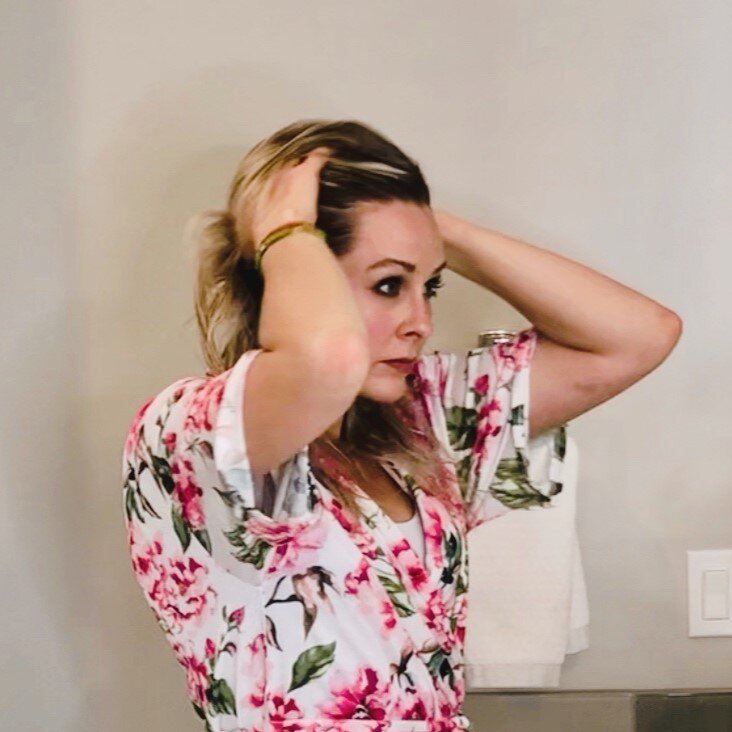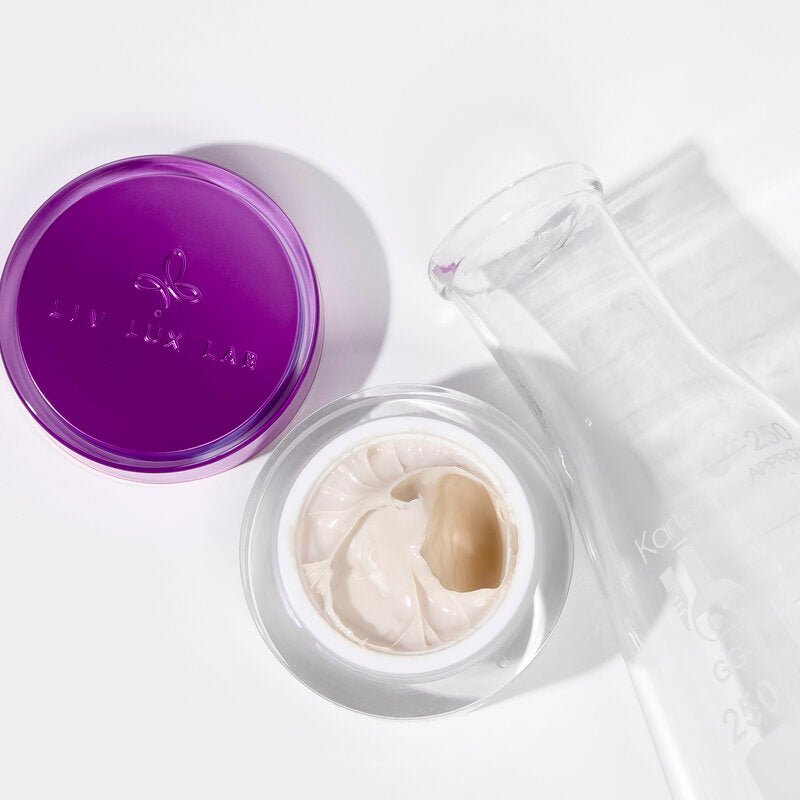Have you noticed all your favorite skin care ingredients seem to be finding a way into your hair care products? The skinification-of-hair age is upon us (or as we like to call it, hairFIXcation). Skin care ingredients found in hair care products is a trend that we’ve grown to know, and you’ll love! Whether it’s micellar-water shampoos, scalp scrubs with alpha hydroxy acids, or from our our entire hair-care line inspired by trending skin ingredients – formulating skin savvy ingredients into haircare works wonders to boost scalp health, aid in hair growth and protect hair from damage.
We all want a head of soft and healthy hair that’s free of flaking or sign of damage. To help achieve this, many people are turning to hair care with reliable skin care favorites such as hyaluronic acid, kaolin clay, and even vitamin C (all of which can be found within SAVE ME FROM!) However, vitamin A or retinol in hair care is relatively uncommon. Vitamin A can be found in nutritional supplements filled with vitamins and minerals that can have beneficial effects on hair but what about the topical application of Vitamin A to the scalp? Retinol, a potent form of vitamin A, is considered the gold-standard in anti-aging skin care but can the scalp and hair benefit too?
What Does Vitamin A Do for Your Hair?
Let’s first start with what Vitamin A supplementation can do for your hair. People with vitamin A deficiencies can notice weaker hair that’s more prone to breakage and hair loss. With the right amount, vitamin A can help with healthy hair growth, making it stronger and thicker. Vitamin A can help dry hair become more hydrated, helping to reduce frizz and prevent brittle hair breakage. However, too much vitamin A (or oral retinol) can also have negative effects on hair. One side-effect of oral retinoids has shown an increase of hair shedding. Read on to hear more about what you should know about oral and topical vitamin A and why a balanced amount is necessary to benefit from its effects.
Can Vitamin A Make My Hair Grow Faster?
With the right amount of vitamin A in your body, it can help with hair growth and hydration. But supplement too much vitamin A in your diet or are on prescribed oral retinol medication, there’s a risk of re-developing hair loss. Here are the different things vitamin A might do for you.
The Good Side
Vitamin A plays an important role in your body. Aside from its effects on your hair, skin, and nails, it can also help improve your vision, immunity, and productive health. Vitamin A also has antioxidant properties, which can help against free radicals and oxidative stress.
For hair there are two functions where vitamin A is essential to good hair growth: cell growth and sebum production.
Improves Cell Growth
Cells make up the different tissues in our body. Our hair is the fastest-growing tissue, and how well cells grow and build your hair can depend on vitamin A as one of the essential components. Healthy hair starts from the roots, which is where new cells form at the base of the follicle. These cells then multiply and form the blocks of what becomes our hair.
Vitamin A can affect cell growth, so enough vitamin A in your body can lead to stronger and thicker hair. It won’t affect existing hair and will only apply to the new shaft that sprouts out of your scalp.
Assists Sebum Production
Sebum is a naturally occurring oil your body produces. The sebaceous glands inside your skin layers release sebum, which is distributed from the hair follicle down to the hair shaft. Your body’s oil production is responsible for keeping healthy skin, scalp, and hair sufficiently hydrated. When applied topically in skin care, the vitamin A derivative, retinol helps to promote growth of skin cells, encouraging cell turnover and stimulating collagen production. This targeted ingredient reduces the appearance of aging skin, uneven texture, and age spots. In addition, it also smooths and refines texture, and makes the skin more plumped and firmer.
When prescribed under the direction of your dermatologist, topical retinol can be effective in boosting scalp health, hair growth, and reducing hair loss due to its rebalancing, decongesting and stimulating properties.
The Bad Side: Hypervitaminosis A
Too little vitamin A isn’t good for your hair, but neither is too much of it. When your body has too much vitamin A, you can develop a condition called hypervitaminosis A or vitamin A toxicity. Vitamin A is a fat-soluble vitamin that’s stored in your liver, but it can only store so much before there are excess amounts of vitamins stored in your body. Aside from hair fall, dry skin, and cracked fingernails, you can also experience a number of serious symptoms like abdominal pain, nausea, and increased pressure on your brain.
Side Effects of Retinol For Skin and Hair
The topical application of retinol also does not come without downsides, including potentially flaky skin, redness, and irritation, purging (where clogged pores come to the surface) and sensitivity, which is why it's super important to wear SPF to avoid sun damage to the skin.
For your scalp, this means a moist scalp that’s less prone to dryness and flaking. For your hair, this means healthy-looking hair that’s not prone to drying out, which can result in brittle hair.
But in large amounts, it can overstimulate your hair follicles. According to a review published in the Federation of American Societies for Experimental Biology in May 2021, one of the side-effects of oral anti-aging retinoids is the increased hair shedding. Retinoids promote the expression of TGF-β2 from fibroblasts, which stimulate collagen expression but silences keratinocytes. Since keratinocytes normally influence differentiation of dermal papilla cells at the base of the hair follicles, retinoids potentially inhibit hair growth due to their effects on TGF-β2. Rather than your hair reaching the end of its growth phase naturally, retinol speeds up the process and triggers the part of your hair’s cycle when it starts to shed. This can cause significant hair loss in certain areas.
Getting the Benefits of Vitamin A and Retinol from Plants
There are two types of vitamin A: preformed vitamin A and provitamin A carotenoids. Your body works with preformed vitamin A substances like retinol, while provitamin A carotenoids like beta-carotene are converted into retinol before your body can use it. Retinol is essential for triggering most of the benefits associated with vitamin A. For your hair, it’s associated with improving blood flow to your scalp and hair follicles, regulating sebum, and removing scalp debris like flakes to help hair care products penetrate the scalp.
Fortunately, the plant kingdom provides an array of alternatives as dual‐acting nutricosmetics and topicals that work independently of TGF‐β2 to confer dermal anti‐aging and hair health effects. These alternatives include ‘plant hormones’ such as cytokinins and phytoestrogens. Many cytokinins are agonists of the G‐coupled adenosine receptors. Partial agonism of adenosine receptors promotes collagen synthesis independently of TGF‐β2 signaling. Adenosine expression is potentially also the mechanism of minoxidil in promotion of scalp hair growth. Because of crosstalk between adenosine and cannabinoid receptors it makes sense to try combinations of specific CB2 agonists and cytokinins (or phytoestrogens). However, dual‐acting cosmetics including peptides with high numbers of positively charged amino acids, such as lysine or arginine, offer real potential as they can be processed from multiple botanical candidates, including almond, fenugreek, pea sprouts, soy, and seaweeds. Fenugreek (aka Trigonella foenum-graecum L.) is a great source of amino acids, arginine, histidine and lysine. These amino acids act as signaling peptides or proteins and have been shown to help promote collagen-1 expression in the fibroblasts. Fenugreek also contains β-carotene, 4-hydroxyisoleucine, and polyphenols making them promising retinoid alternatives from the plant kingdom.
Fenugreek Seeds vs. Retinol for Hair Growth
Fenugreek, an Ayurvedic herb that has been used for centuries for its health and medicinal benefits, is one of the oldest medicinal plants due to its exceptional medicinal and nutrient profile. Fenugreek seeds contain a substantial amount of fiber, phospholipids, glycolipids, oleic acid, linolenic acid, linoleic acid, choline, vitamins A, B1, B2, C, nicotinic acid, niacin and many others functional nutrients which have been used as a home remedy to promote scalp health, aid in hair growth and promotes thicker, shinier hair as a result.
This antioxidant rich herb rich is a natural alternative to retinol as fenugreek seeds are a rich source of vitamin A, which can aid in scalp health, boost hair thickness + reduces hair loss.
Recent studies indicate that phospholipids, found within fenugreek seeds, not only serve as structural elements, but that they also play an important role in regulating cellular functions, shown to support the regeneration of hair follicles and promote hair growth.

Fenugreek seeds are a rich source of conditioning mucilage, proteins & signaling amino acids, vitamins A, B vitamin (such as niacinamide), vitamin C & folate, minerals such as iron, phosphorous & selenium — all essential nutrients for hair growth.
To add on, research has shown that fenugreek seeds can be a natural method of treating low to moderate hair loss in men and women. Plant compounds found within fenugreek, may interact with a chemical in the body known as DHT (dihydrotestosterone). If DHT attaches itself to the hair follicles, the result, sooner or later, would be hair loss. Fenugreek may slow down the ability of DHT to attach to the hair follicles.

Using SAVE ME FROM's Concentrated Bonding Cream-to-Serums - each are a 2-in-1 hybrid scalp serum + hair restoring bond treatment that can help with a healthy scalp and hair moisturizer. The result is optimal hair growth and hair that emerges more resistant to breakage for reduced hair loss.
How to Make Vitamin A Work for You
One study found that a deficiency in vitamin A can lead to metaplasia of keratinized epithelia including the hair follicle and atrophy of the sebaceous gland. Although vitamin A is an important vitamin for hair growth, supplementing a diet with too much vitamin A can actually lead to hair loss.
Eating a diet with foods rich in vitamin A, will help you get the proper dose of this important nutrient. Eggs, berries, spinach, fatty fish, oysters, soybeans, sweet potatoes, peppers, avocados, nuts + seeds all pack the essential nutrients that affect the health of your hair including vitamin A as well as vitamins B, C, D, and E, along with iron, protein, biotin, and essential fatty acids.

A cup of spinach provides up to 20% of your daily vitamin A needs!
A diet lacking the right nutrients may slow down hair growth that can lead the hair thinning and hair loss. Although these nutrients may help treat hair loss and promote the rate of hair growth, topical treatments can be effective for promoting hair growth at home.
Natural Dietary Sources of Vitamin A
If you’re practicing a balanced diet, you’re likely getting your recommended dose. Here are some food sources rich in vitamin A:
- Dairy products
- Eggs
- Fatty fish (tuna, salmon, trout, sardines, etc.)
- Fish oil
- Liver (beef, pork, chicken)
- Leafy green vegetables
- Orange, yellow, and red vegetables (carrots, sweet potato, bell peppers, squash)
- Tomatoes
- Mangoes
Foods that come from animals contain preformed vitamin A like retinol, while plant-based food sources contain provitamin A carotenoids like beta-carotene, which our bodies convert to vitamin A.
Ingredients to Work Into Your Skin Care Routine and Hair Care Regimen
Since retinol (vitamin A) can be drying, it's important to keep the scalp hydrated. Using a nourishing scalp treatment that are free of mineral oils and parabens or using oils such as karanja or coconut oil with antimicrobial benefits (which can be found within SAVE ME FROM's clean + clinically tested formulas) help soothe, reduce inflammation, and balance the scalp.
Should I Take Vitamin A Supplements?
Vitamin A supplements are best recommended for those with a vitamin A deficiency. If you have a balanced diet that includes vitamin A-rich food, you’re likely getting all the vitamin A you need. But if you want to be certain, you can consult a doctor and have blood tests done to determine if you have a vitamin A deficiency. If you do, your doctor may recommend you take vitamin A supplements, which are a source of preformed vitamin A.
Because a lot of sources of vitamin A are animal-based, people with vegan and vegetarian diets may not have access to preformed vitamin A. Some may be able to get the vitamin A they need by consuming fruits and vegetables rich in beta-carotenes their bodies can convert to vitamin A. But for those with medical conditions that make it difficult to absorb or convert beta-carotenes, vitamin A supplements can help you meet your daily vitamin A intake.
Other Vitamins That Can Improve Hair Growth
Other vitamins and nutrients can have an effect on your hair. If you don’t have a vitamin A deficiency, having other vitamin deficiencies can also lead to poor hair health. These are the other vitamins you should consider getting tested for on top of vitamin A to see if you have a potential deficiency and should take supplements.
Vitamin B Complex
Most B-vitamins can help with improving your circulatory system and bringing blood flow to the scalp and hair follicles. This can provide your hair with the oxygen it needs to grow properly. A biotin deficiency (Vitamin B7), in particular, is linked to hair loss in humans. Most B vitamins are found in both animal and plant-based food sources, but the best sources of vitamin B12 are in animal products, so vegans and vegetarians may need supplements.
Vitamin C
Vitamin C is an antioxidant that can help your damaged hair in several ways:
- Blocks free radical damage and oxidative stress that can age and dry out hair
- Assists in collagen production, which can help create a stronger hair structure
- Helps your body absorb iron, which can help with blood cells and circulation, which can improve hair growth
Citrus fruits, strawberries, and peppers are good sources of vitamin C.
Vitamin D
Studies have shown that those with low vitamin D levels experience alopecia or hair loss. You can get vitamin D by direct sun exposure, but you can also get it from fatty fish and mushrooms.
Vitamin E
Vitamin E is also an antioxidant that can protect your hair from the sun’s UV rays and harmful free radicals. This can prevent your hair from drying out. Sunflower seeds, avocados, and spinach are some good food sources to get healthy doses of vitamin E.

Conclusion
Have your doctor check if you have any nutritional deficiencies. If there isn’t, your hair loss may be caused by an underlying medical condition (like an autoimmune condition or thyroid disease), genetic hair loss, or poor hair care practices. Vitamin A is good for your body, but in a balanced amount that's right for you. Too little or too much and it can have negative effects on your hair as well as the rest of your body. If you suspect you have a nutritional deficiency, talk to your doctor to see if dietary supplements are the right choice for you.
The Ayurvedic Spice That's Changing Everything
Save Me From Hair Repair was born inspired by Ayurvedic medicine. We've harnessed the fenugreek's rich phytonutrients and magnified them into our clinically proven technology. Fenugen possesses the rich nutrients of fenugreek seeds in a complex 5x more potent in polyphenols. These nutrients include Vitamin A, B Vitamins, Vitamin C and more. With consistent, long-term use, hair bonds are rebuilt, hydration is restored helping to reduce frizz, the scalp is energized and nourished from within allowing hair that's more resistant to damage to emerge. Rooted in Ayurveda, our Fenugen is clinically proven to transform hair from tip to root, inside and out.
Watch the results of a fenugreek hair mask versus Fenugen, found in every SAVE ME FROM concentrated bonding cream-to-serum hair treatment.





